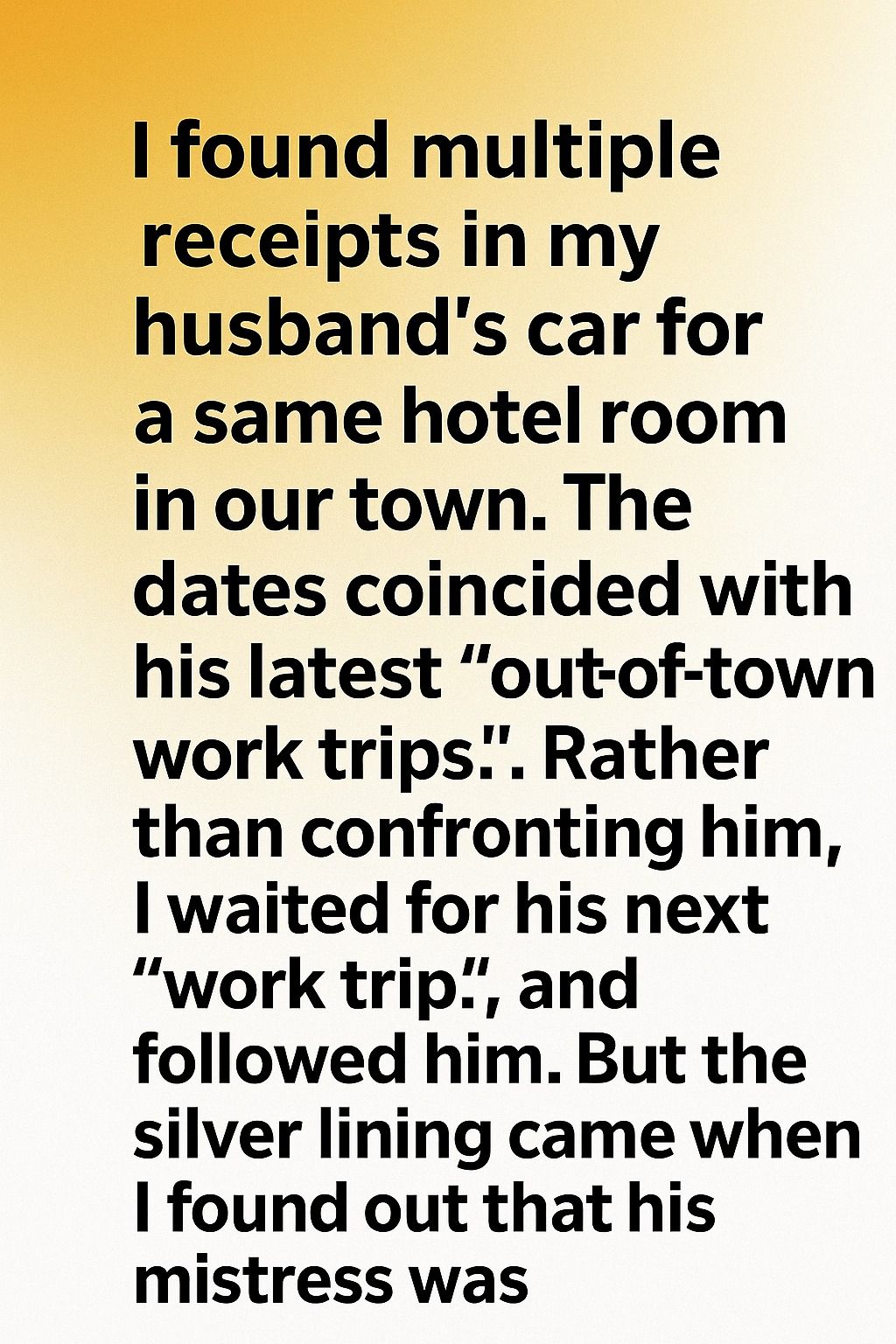I once discovered receipts in my husband’s car for a hotel in our very own town. At first, I thought it might be a mistake, or perhaps a simple coincidence, but the more I looked at the dates and details, the harder it became to ignore the possibility that something was amiss. The receipts were clear, undeniable, and perfectly aligned with the so-called “out-of-town” work trips he had been claiming for weeks. My heart raced when I realized the pattern, yet I reminded myself to stay calm.
The conflict inside me was intense. Part of me wanted to confront him immediately, to demand an explanation and face whatever truth awaited me. But another, quieter part urged patience, urging me to observe, to gather facts, and to understand the situation fully before reacting. I chose that second path, deciding to wait, to quietly watch and learn without jumping to conclusions. It was not easy — every day was a mix of worry, anticipation, and a sense of unease that lingered in the background of my mind.
When his next “trip” came around, I knew I had to follow him, to see with my own eyes what was happening. I borrowed a car from a neighbor and kept my distance, making sure not to be noticed. My hands trembled, not out of anger, but from the nervous energy of uncertainty. What would I find? Would my suspicions be confirmed, or would it be something else entirely, something that could explain the odd behavior without breaking the trust I had built over the years?
As I trailed him, every red light and turn felt monumental. I replayed countless memories of our life together in my mind: the laughter, the late-night talks, the shared dreams and struggles. Could all of that be overshadowed by a single secret? The weight of the unknown pressed heavily on me, yet I felt a strange sense of empowerment. This was a moment where I could confront reality on my own terms, where clarity might finally bring peace.
The hours passed slowly as I followed him, and each step was accompanied by a flood of emotions — fear, suspicion, sadness, and even a glimmer of hope that there might be a reasonable explanation. I imagined every possible scenario, from the mundane to the heartbreaking, and realized that whatever awaited me, I had to face it with courage and composure. The thought that trust, once broken, could still be rebuilt reminded me that patience was my strongest ally in this moment.
Finally, the moment of truth arrived. I saw him enter the hotel and, after a tense pause, discovered that the person he was meeting was not a stranger, nor someone with intentions of betrayal. Instead, it was someone I had long admired for her kindness, someone whose compassion and warmth had always stood out in our community. Shock flooded me, but it was mixed with relief and an unexpected sense of perspective. Life had placed me in this uncomfortable position not to punish me, but to reveal a reality that I would have never understood otherwise.
As I sat in my car, digesting the scene before me, I reflected on the complexity of human relationships. People often carry layers of connection, history, and unspoken bonds that can appear confusing or misleading at first glance. My mind raced with questions about intentions, honesty, and trust, yet I felt a growing sense of calm. The situation, while initially alarming, had provided clarity and insight into the way I viewed others and the assumptions I made about them.
The experience ultimately taught me more about myself than it did about anyone else. I realized the importance of resilience — the ability to remain grounded and composed even when faced with unsettling truths. I understood that pain, disappointment, and uncertainty are part of life, but they are also opportunities for growth and self-discovery. In standing back, observing, and choosing patience, I had exercised my own strength and reinforced my sense of self-worth.
Through this journey, I learned that painful truths can still teach invaluable lessons about honesty, trust, and human nature. The situation reminded me that we cannot always control the actions of others, but we can control how we respond, how we process information, and how we maintain our dignity in the face of uncertainty. Even when life challenges us in unexpected ways, there is room for reflection, learning, and ultimately, personal growth.
In the end, I emerged from the experience with a renewed sense of perspective. I understood that relationships are complex, layered, and sometimes ambiguous, and that navigating them requires patience, courage, and empathy. I learned that disappointment, while painful, can serve as a catalyst for deeper understanding and emotional maturity. Most importantly, I realized that rising above difficult situations is not about avoiding discomfort, but about confronting reality with honesty, compassion, and an unwavering belief in one’s own strength.
Even in disappointment, there can be growth — a reminder that we cannot always control what others choose, but we can choose how we rise above it. The experience left me with a quiet sense of empowerment, a knowledge that resilience and patience can guide us through even the most unsettling moments. And while the journey was difficult, the lessons it imparted were profound, reaffirming the value of self-respect, introspection, and the courage to face life’s truths without fear.
